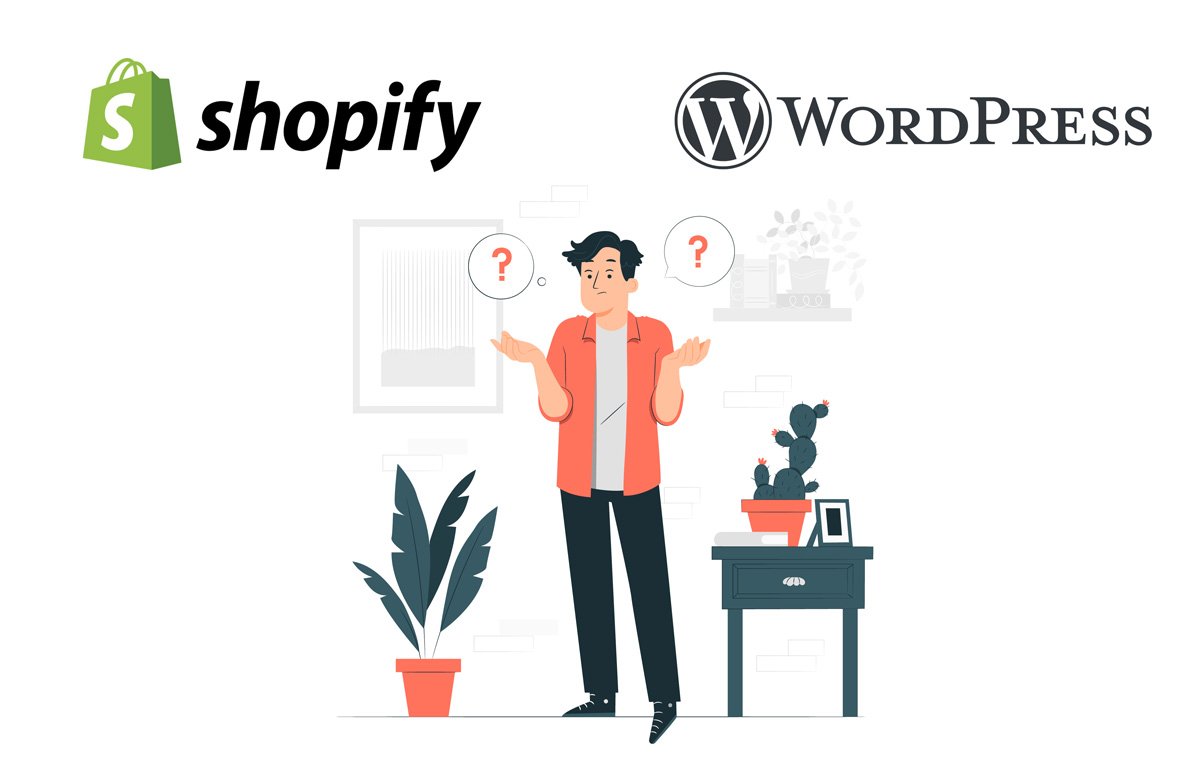WordPress and Shopify are two of the most popular ecommerce platforms in the world. Both have plenty of benefits, but which one is better for your business? As an Ecommerce website developer, I get to see many businesses launch their online stores every day. Many of my clients ask me about WordPress vs Shopify – which one is better for their company and why? In this blog post, I’ll explain the differences of both platforms as well as tips on if you should use WordPress or Shopify based on your company’s needs.
What is Shopify?
Shopify is a cloud-based ecommerce platform designed for small to medium-sized businesses. Shopify offers a wide range of ecommerce solutions including the ability to create a fully customized website with a variety of built-in features like payment gateway integration, product and inventory management, and order tracking. Shopify’s intuitive interface makes it easy for anyone to set up an online store and start selling products in just a few minutes. For business owners who want to get started with ecommerce but don’t want to deal with the hassle of building their website from scratch, Shopify is a convenient solution.
What is WordPress?
WordPress is a free and open-source blogging platform first released in 2003. Over the years, WordPress has grown into a popular website content management system (CMS) that powers almost 30% of the web. WordPress is used by individuals and companies of all sizes to create everything from simple websites to complex online stores and apps. Its popularity lies in the fact that it’s extremely scalable, customizable, and extremely user-friendly. WordPress can be described as a website builder where you can host your store and sell products. You can also create a simple blog on it if you want. However, unlike Shopify, you will have to do the design and development part yourself.
Shopify vs WordPress: Detailed Comparison
Before choosing between Shopify and WordPress, it is best to know the main feature differences in both platforms. The below points will give you a clear idea of how these platforms are different from each perspective.

Availability of resources
To be able to customize the features on a Shopify website, you may need to purchase paid addon subscriptions. Obviously, there are free addons for Shopify but they will be having limited features. I have worked with many Shopify websites and there were situations where I was forced to get paid subscriptions in Shopify app store to obtain certain features.
If you choose WordPress, you have the entire community at your disposal. This means you can tap into the expertise of thousands of developers and designers around the world. You’ll also have access to millions of free and paid plugins and themes that let you customize your website and Ecommerce store to fit your brand, your needs, and your preferences. You can also find a lot of easy-to-learn WordPress tutorials on Youtube. If you can spend time, you can try installing different free plugins to get the features you need.
File access, backups and restoration
With Shopify, you get automatic backups that are stored in the cloud so you don’t have to worry about losing your data.
With WordPress, you can backup and migrate your website from one server to another using free or paid plugins, or use the backup and restore facility on your hosting service. You can setup WordPress on almost any hosting package and you will have complete control over the files and database of your website. In short, you completely own the site!
Development costs
The cost of developing a Shopify website is high compared to WordPress. Shopify themes/templates are built in ‘Liquid’ coding language which may not be familiar for most website owners. Hence, hiring a Shopify developer can cost you more money!
WordPress is an open-source platform built in PHP coding language and MySQL/MariaDB database. The frontend and backend layouts are rendered using HTML, Javascript and CSS; controlled by PHP codes and database queries. This makes it easy for most website owners to make simple changes by watching online tutorials. Also hiring a WordPress developer costs you less money compared to Shopify. This will help you save on initial investment for your business.
Ability to customize
If you choose Shopify, you might find it difficult to customize the website unless you’re familiar with coding languages as noted above. And even if you hire a website developer, there will be some restrictions for customization as we do not have 100% access to Shopify files and database structure.
WordPress is more of a plug-and-play platform so it is easy to get started. You have the freedom to do whatever you want with your website as you have complete access to files and the database. If anything goes wrong, you can just restore a backup. You will have to spend some time learning how to use the platform and hire a web developer to help with the design if needed. Also, you can use popular website builder plugins like Elementor (free) or WP Bakery Page Builder (paid) which will help you design pages using a drag and drop interface.

Monthly expenses
If you choose Shopify, you will need to use a paid plan that starts from 29USD per month. If you need more features, the pricing will be 79USD per month. And the most advanced plan is 299USD per month. Each plan has different benefits, especially transaction charges that differ in each package. You will also need to pay for additional paid addons/apps you use.
If you choose WordPress, you’ll have to pay for yearly hosting. Getting cheap web hosting is easy nowadays and a normal hosting package costs only about 10USD per month. If you need more resources, you will be spending about 30-60 USD per month based on the size of your website. You will also need to pay for additional paid plugins you are planning to use.
Periodical updates
If you choose Shopify, you’ll get regular updates that introduce new features, plug-ins, and integrations.
If you choose WordPress, you’ll have to stay on top of new updates and make sure you update your website plugins and theme as soon as new features are available. Updates include WordPress core, plugins and theme. In this case, you will be managing all the updates on your own. There may be unfortunate situations where the updates fail and the site become unavailable where you will need expert help. In most cases, you take responsibility and move on!
Security
Which one is more secure? WordPress or Shopify? There is no simple answer to this question. Both WordPress and Shopify are popular Ecommerce platforms having their own strengths and weaknesses when it comes to security.
So, which platform is more secure? It depends on how you use each platform and how diligent you are about keeping your site up-to-date. That said, both WordPress and Shopify offer several security features that can help protect your site from hackers. Additionally, you need to make sure that you update themes and addons/plugins from time to time. Hackers find it easy to hack wordpress websites as most website owners do not update their themes and plugins periodically. Also using weak usernames and passwords can get your site hacked in no time. We must keep it secured.
Which one is best? WordPress or Shopify?

If you want more control over your website and save some money on the development, then WordPress will be the best self-hosted Ecommerce solution for you. Also, you can avoid additional charges by using free plugins from the WordPress plugins repository. Shopify is like a managed Ecommerce platform where the company will take the responsibility of managing the core files of your website. As a managed hosting platform, Shopify has some restrictions when it comes to customization. Different businesses have different requirements. You may need to compare both platforms to see the feasibility and decide which one to choose. An experienced web developer can tell you which platform is best for your website project.

